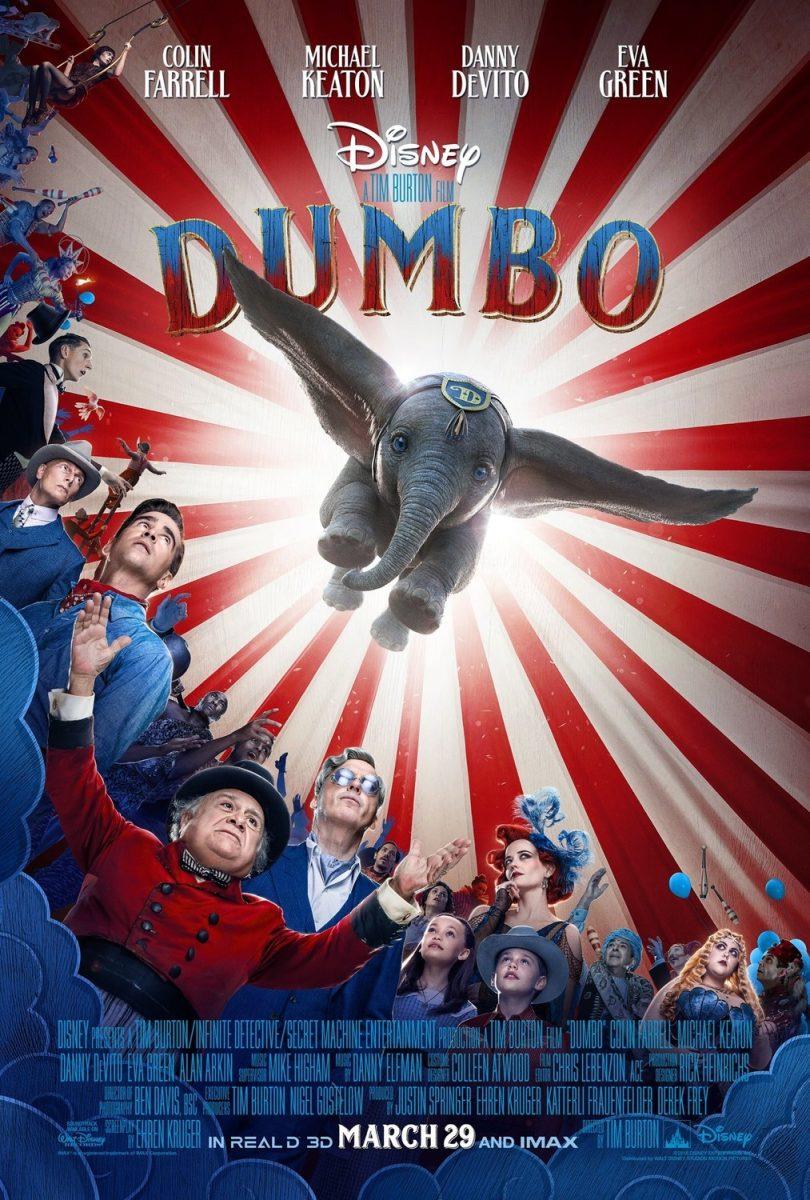With Disney’s recent acquisition of 20th Century Fox, they have solidified their corporate influence over America’s pop culture.
With this control, they continue to prove they have no problem with recycling old content to sedate their audiences into monetary submission. While creating “live-action” animated remakes may not seem like a hindrance to the film industry, Tim Burton’s “Dumbo” spits in the face of its nostalgia-craving audience with its unironic representation of Disney’s corporate domination within Hollywood.
The popularity and general positive feelings in pop culture toward the original “Dumbo” have always been troubling. The 1941 version of the film is one of the main indicators of Walt Disney’s and Hollywood’s underlying racism. The film features a crow named Jim voiced by white-actor Cliff Edwards. This overt allusion to the Jim Crow laws and minstrel shows, both of which existed when the original film was produced, is an impossible issue to ignore when viewing the film today. So this remake serves as a mechanism for Disney to cover up their racist past with a glossed over big-budget film that never acknowledges the original issue.
Although the severity of the racist undertones of the original certainly should prevent the film from achieving its top-tier pop culture status, it still resonates with adults and children alike as a heartwarming tale of accepting one’s differences in the face of ridicule. While individuality is obviously an important quality for all ages, the circumstances of the film’s remake veil the message of the original film. While Tim Burton’s signature Gothic-steampunk style is an aesthetically pleasing addition to the narrative, the underlying message shifted away from individuality and toward a dissection of the effects of corporate influence over creativity.
Obviously, the not-so subtle irony slaps the audience in the face throughout the run time in many aspects. First, the influence of washed up director Burton is directly representative of Disney’s pseudo-support of creativity. Burton, whose early career was an adrenaline shot of creativity to the heart of Hollywood, has wilted away from his former self since the 2000s. The name “Tim Burton” used to be an indication of creativity but now represents one of many Hollywood directors used as an apparatus to capture audiences’ money.
Second, and similar to Burton, Disney’s influence used to be associated with creativity and originality. However, as evident in their constant onslaught of sequels in their Marvel, Pixar and Lucasfilm franchises, they have clearly lost their ability to critique the influence of corporate-produced “art.”
“Dumbo” is a sloppy combination of two parties who have substituted the artistic expression of film for an assembly line of money-printing remakes and sequels.
However, the production and existence of the film prove more worrisome than the film itself. Without the consideration of its influences, “Dumbo” is an uninspired clutter of famous actors in unnecessary roles talking to “life-like” animated animals.
The only aspect of the film which garnered any engagement was the odd cameo of German actor Lars Eidinger. Most famous in the United States for his work with Olivier Assayas and his contribution as a jury member at the 2016 Berlinale, Eidinger has a small and completely insignificant role in this film. With an actor of his prowess, it is odd to see him in such a minor role within a dreadful film.
The film’s ultimate goal was always to cash in on the nostalgia of the original film, but “Dumbo” refuses to face, or even acknowledge, its racist history and does so while trying to convey an anti-corporate message.
Disney certainly has no ground to make critiques of the current model of monetarily driven “art,” and they chose a director who is the best example of Hollywood corruption. Disney will continue to shove Marvel and Pixar sequels down its audience’s throat until its revenue stream runs dry. As shown in recent box office numbers of the Marvel films, Disney is showing no signs of stopping their domination of the American film industry.
Cole Fowler is an English junior and columnist for The Battalion.
‘Dumbo’ is an uninspired cash grab
March 31, 2019
Photo by Creative Commons
Disney’s live-action remake of Dumbo was released on March 29.
0
Donate to The Battalion
$1745
$5000
Contributed
Our Goal
Your donation will support the student journalists of Texas A&M University - College Station. Your contribution will allow us to purchase equipment and cover our annual website hosting costs, in addition to paying freelance staffers for their work, travel costs for coverage and more!










